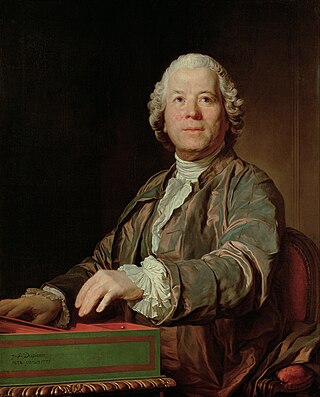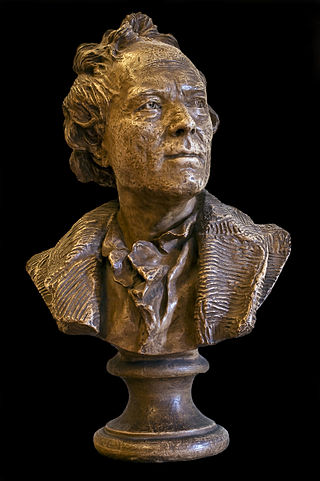Related Research Articles

Christoph WillibaldGluck was a composer of Italian and French opera in the early classical period. Born in the Upper Palatinate and raised in Bohemia, both at the time part of the Holy Roman Empire, he gained prominence at the Habsburg court at Vienna. There he brought about the practical reform of opera's dramaturgical practices for which many intellectuals had been campaigning. With a series of radical new works in the 1760s, among them Orfeo ed Euridice and Alceste, he broke the stranglehold that Metastasian opera seria had enjoyed for much of the century. Gluck introduced more drama by using orchestral recitative and cutting the usually long da capo aria. His later operas have half the length of a typical baroque opera.

Orfeo ed Euridice is an opera composed by Christoph Willibald Gluck, based on the myth of Orpheus and set to a libretto by Ranieri de' Calzabigi. It belongs to the genre of the azione teatrale, meaning an opera on a mythological subject with choruses and dancing. The piece was first performed at the Burgtheater in Vienna on 5 October 1762, in the presence of Empress Maria Theresa. Orfeo ed Euridice is the first of Gluck's "reform" operas, in which he attempted to replace the abstruse plots and overly complex music of opera seria with a "noble simplicity" in both the music and the drama.

Alceste, Wq. 37, is an opera by Christoph Willibald Gluck from 1767. The libretto was written by Ranieri de' Calzabigi and based on the play Alcestis by Euripides. The premiere took place on 26 December 1767 at the Burgtheater in Vienna.

Idomeneo, re di Creta ossia Ilia e Idamante is an Italian-language opera seria by Wolfgang Amadeus Mozart. The libretto was adapted by Giambattista Varesco from a French text by Antoine Danchet, based on a 1705 play by Crébillion père, which had been set to music by André Campra as Idoménée in 1712. Mozart and Varesco were commissioned in 1780 by Karl Theodor, Elector of Bavaria for a court carnival. He probably chose the subject, though it may have been Mozart. The work premiered on 29 January 1781 at the Cuvilliés Theatre in Munich, Germany.

The Theater an der Wien is a historic theatre in Vienna located on the Left Wienzeile in the Mariahilf district. Completed in 1801, the theatre has hosted the premieres of many celebrated works of theatre, opera, and symphonic music. Since 2006, it has served primarily as an opera house, hosting its own company.
La rencontre imprévue, ou Les pèlerins de la Mecque Wq. 32 is a three-act opéra comique, composed in 1763 by Christoph Willibald Gluck to a libretto by Louis Dancourt after the 1726 comédie en vaudevilleLes pèlerins de la Mecque by Alain-René Lesage and d'Orneval. The death of Isabella of Parma, the archduke's wife, occasioned a revision of the spoken text downplaying the feigned death by which princess Rezia tests her beloved. The work was first performed in this form as La rencontre imprévue at the Burgtheater, Vienna on 7 January 1764. Dancourt's original text, titled Les pèlerins de la Mecque and designated as a comédie mêlée d'ariettes, was not premiered until 1990.
Le cadi dupé is an opéra comique in one act by Christoph Willibald Gluck. It has a French-language libretto by Pierre-René Lemonnier. It premiered at the Burgtheater in Vienna on 8 December 1761. The libretto had already been set by Pierre-Alexandre Monsigny in an opera that had premiered on 4 February of the same year at the Paris Foire St-Germain.
Le diable à quatre is an opéra comique in three acts by Christoph Willibald Gluck. The French-language libretto is by Michel-Jean Sedaine and Pierre Baurans, after a translation by Claude-Pierre Patu of the 1731 ballad opera by Charles Coffey entitled The Devil to Pay, or The Wives Metamorphos’d. It was first performed at Laxenburg on May 28, 1759. The work was a popular success. Joseph Haydn used a melody from it, "Je n’aimais pas le tabac beaucoup " in the first movement of his symphony Le soir.

Don Juan ou Le Festin de Pierre is a ballet with a libretto by Ranieri de' Calzabigi, music by Christoph Willibald von Gluck, and choreography by Gasparo Angiolini. The ballet's first performance was in Vienna, Austria on Saturday, 17 October 1761, at the Theater am Kärntnertor. Its innovation in the history of ballet, coming a year before Gluck's radical reform of opera seria with his Orfeo ed Euridice (1762), was its coherent narrative element, though the series of conventional divertissement dances in the second act lies within the well-established ballet tradition of an entr'acte effecting a pause in the story-telling. The ballet follows the legend of Don Juan and his descent into Hell after killing his inamorata's father in a duel.
Magdaléna Hajóssyová is a classical Slovak soprano who has had an active international career singing in operas, concerts, and recitals since the late 1960s. She has been particularly active at the Prague State Opera where she has been a principal artist since 1972. She has also had a long and fruitful partnership with the Berlin State Opera beginning in 1975. In 1977, 1981, and 1987, she won the Berlin Critic's Prize for her portrayal of the roles of Margarete in Charles Gounod's Faust, the Elektra in Mozart's Idomeneo, Carl Maria von Weber's Euryanthe, and Christoph Willibald Gluck's Iphigénie en Aulide.

Pierre-Louis Moline was a prolific French dramatist, poet and librettist. His play La Réunion du six août was one of the longest-running patriotic pieces during the time of the French Revolution with 52 performances at the Paris Opéra. He also wrote the epitaph for the tomb of Jean-Paul Marat. However, he is best remembered today for having adapted Calzabigi's libretto for Gluck's Orphée et Euridice.
L'arbre enchanté, ou Le tuteur dupé, Wq 42, is a one-act opéra comique by Christoph Willibald Gluck to a libretto based on the 1752 opéra-comique Le poirier with a text by Jean-Joseph Vadé. Vadé's libretto was based on a tale from Boccaccio's Decameron, as retold by Jean de La Fontaine. Gluck's opera was written for the name day of Emperor Francis I, premiering at the Schönbrunn Palace in Vienna on the evening of 3 October 1759, the anniversary of the death of Saint Francis of Assisi.

The following discography for Gluck's opera Orfeo ed Euridice is mainly based on the research of Giuseppe Rossi, which appeared in the programme notes to the performance of the work at the 70th Maggio Musicale Fiorentino in 2007, under the title "Discografia – Christoph Willibald Gluck – Orfeo ed Euridice ". Rossi's data has been checked against the sources referenced in the notes.
Ezio is an opera seria from the Early Classical Period in three acts composed by Christoph Willibald Gluck, staged in 1750 and revised in 1763.
Daniel Heartz (1928–2019) was an American musicologist and professor of music at the University of California, Berkeley.

Franco Maximiliano Fagioli is an Argentine operatic countertenor.

Schlosstheater Schönbrunn is a stage at Schönbrunn Palace in Vienna which opened in 1747. The Baroque theatre now serves for the training of students of acting and opera of the University of Music and Performing Arts Vienna (MDW), and for performances of the Musik Theater Schönbrunn.
Gerhard Croll was a German-Austrian musicologist.
Daniela Philippi is a German musicologist with a research focus on Christoph Willibald Gluck, Antonín Dvořák and Czech music history and music of the 20th century.
References
- 1 2 3 "Bruce Alan Brown". USC Thornton School of Music. Archived from the original on 2012-05-09. Retrieved September 8, 2012.